Mercedes EQE first drive: this is the best Mercedes EV to date
Move over EQS, the EQE is here

We've already reviewed the EQS, Mercedes' flagship all-electric luxury sedan, and came away impressed with its supreme comfort, excellent range, and forward-looking tech.
Now the storied German marque is looking to replicate the experience in a slightly lighter, smaller, nimbler, and more affordable EV, the Mercedes EQE executive sedan.
We recently drove the EQE in Germany and here are our first impressions.
Mercedes EQE specs and features
Two EQE models will be available in the US and Europe later this year: the EQE 350+ (RWD) and the EQE 500 4Matic (AWD).
While we don't have any exact information on pricing and trim levels yet, we do have some specs. Like the EQS, the EQE is built on Mercedes' EVA all-electric platform. Both models feature a 90.6kWh (usable) battery pack with 10 modules (vs. 107.8kWh and 12 modules on the EQS).
For the EQE 350+, Mercedes is using a single motor between the rear wheels, good for 288hp (212kW), 391lb-ft (530 Nm) of torque, and a 0-60mph (0-96km/h) time of 6.2 seconds.
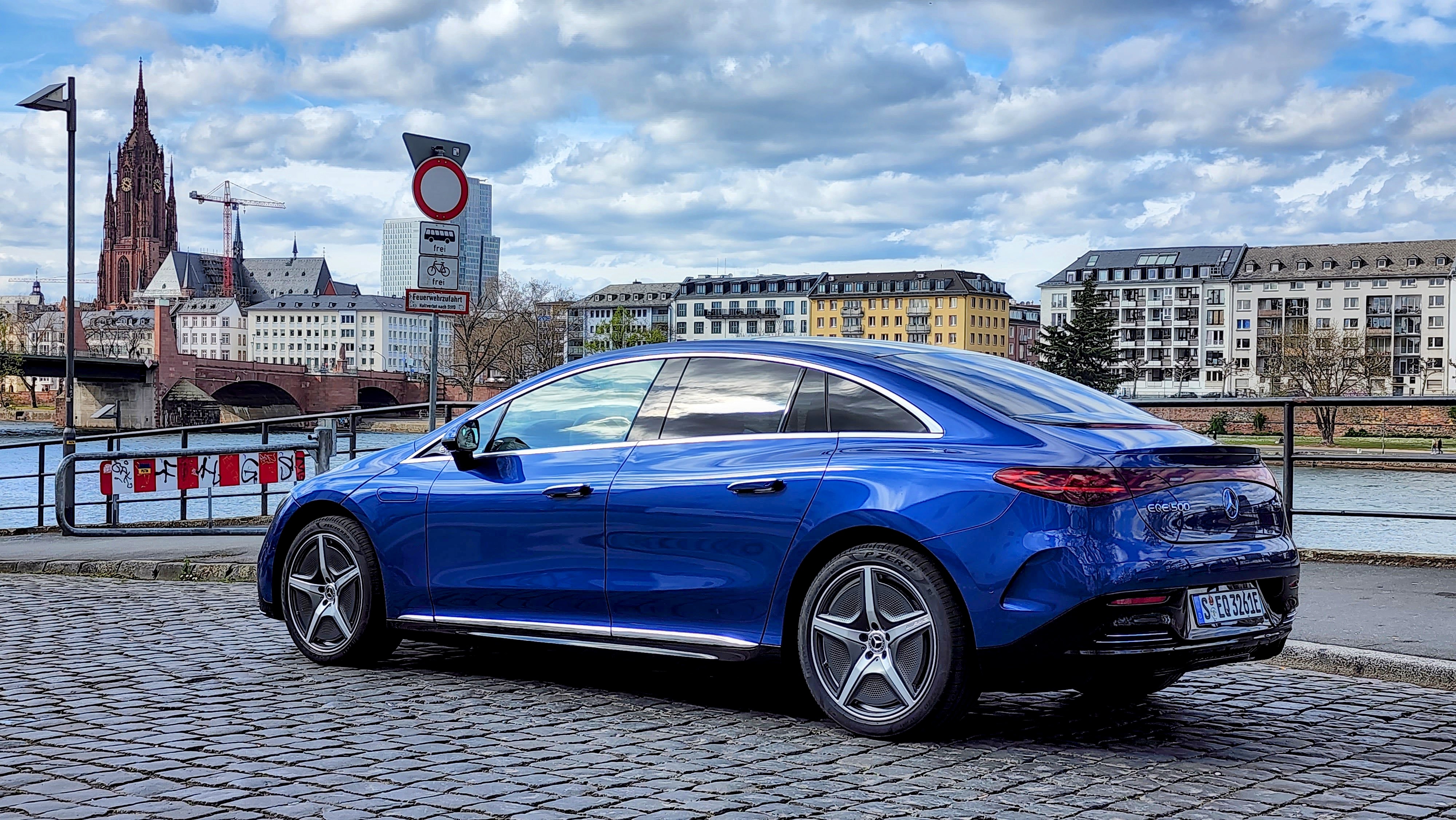
The EQE 500 4Matic adds a second motor between the front wheels for a total output of 402hp (300kW, torque unknown), resulting in a 0-60mph (0-96km/h) sprint in 5.2 seconds. Range is 660km / 410 miles (WLTP) and 350 miles (EPA estimate) for both models.
Sign up for breaking news, reviews, opinion, top tech deals, and more.
In addition, a dual-motor AMG EQE 4Matic+ will be available in 2023 with the same 90.6kWh battery pack and with upwards of 617hp (453kW) and 701lb-ft (950Nm) of torque. This version will be capable of accelerating to 60mph (96km/h) in less than 3.5 seconds.
When it comes to charging, the EQE supports DC fast charging at up to 170kW (10-80% in 32 minutes), plus Level 2 AC charging at up to 11kW (tri-phase).
The EQE is packed with standard features, including a 12.8-inch center OLED touchscreen, heated and ventilated seats, a panoramic sunroof, and a Burmester audio system.
Rear-wheel steering (up to 10 degrees), air suspension, Mercedes' 56-inch Hyperscreen, a heads-up display, a 360-degree view, matrix headlights, Level 2 driver assistance, massaging seats, 4-zone climate control, and aromatherapy are all optional.
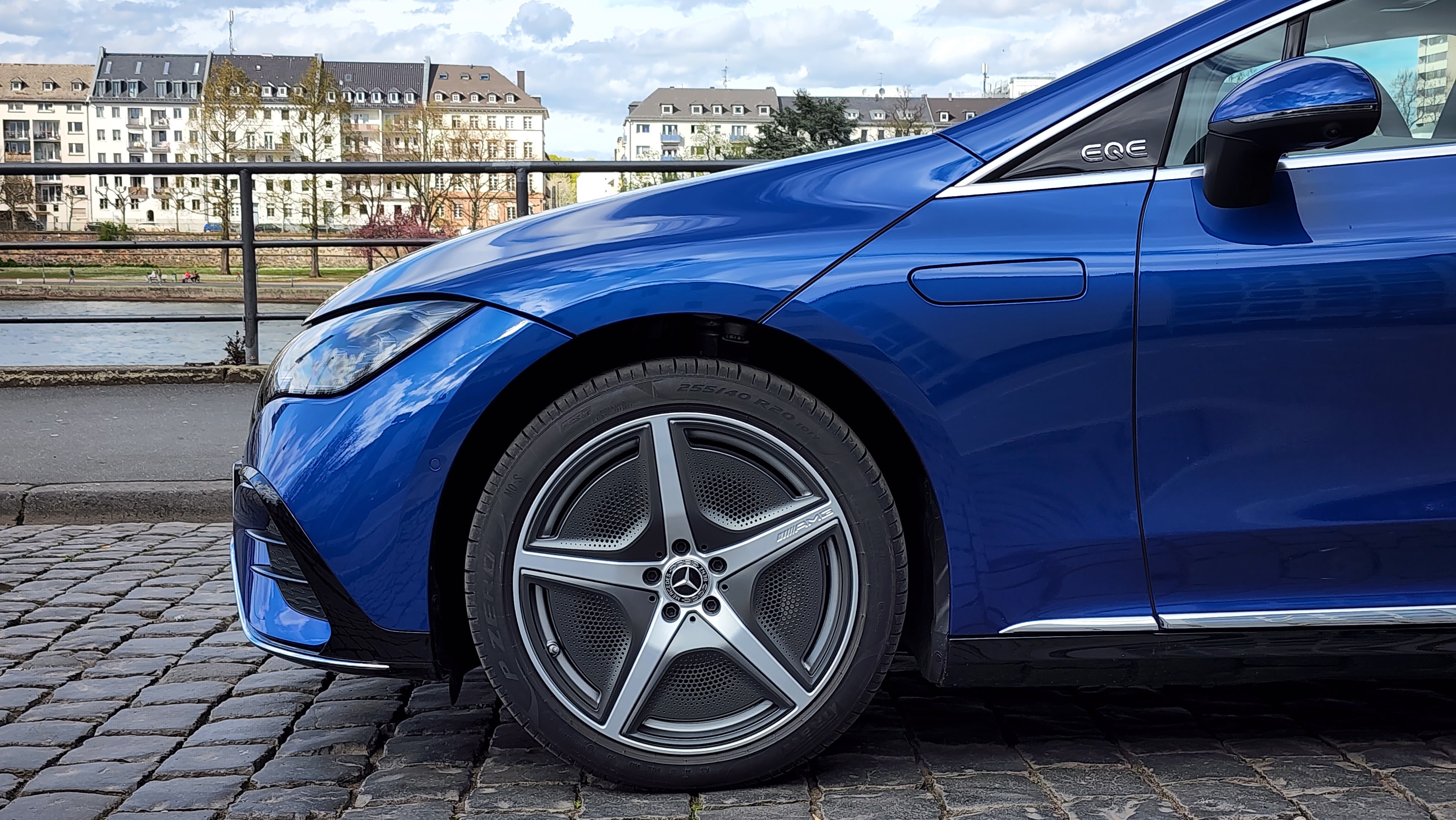
Mercedes EQE tech
As you'd expect, the EQE inherits most of the EQS' technology. This includes self-parking, a 360-degree view, LTE connectivity, WiFi hotspot support, OTA (over-the-air) software updates, phone-as-a-key functionality, phone remote control via the "me Connect" app, wired and wireless Apple CarPlay and Android Auto, Qi wireless phone charging, internet audio streaming, and the "Hey Mercedes" voice assistant.
The EQE comes standard with a 12.8-inch OLED infotainment touchscreen plus a 12.3-inch LCD instrument display. Mercedes' dashboard spanning 56-inch Hyperscreen is optional, just like on the EQS.
It consists of three separate displays bonded to a massive curved glass panel - a 12.3-inch instrument display for the driver, a 17.7-inch center touchscreen, and a 12.3-inch touchscreen for the passenger.
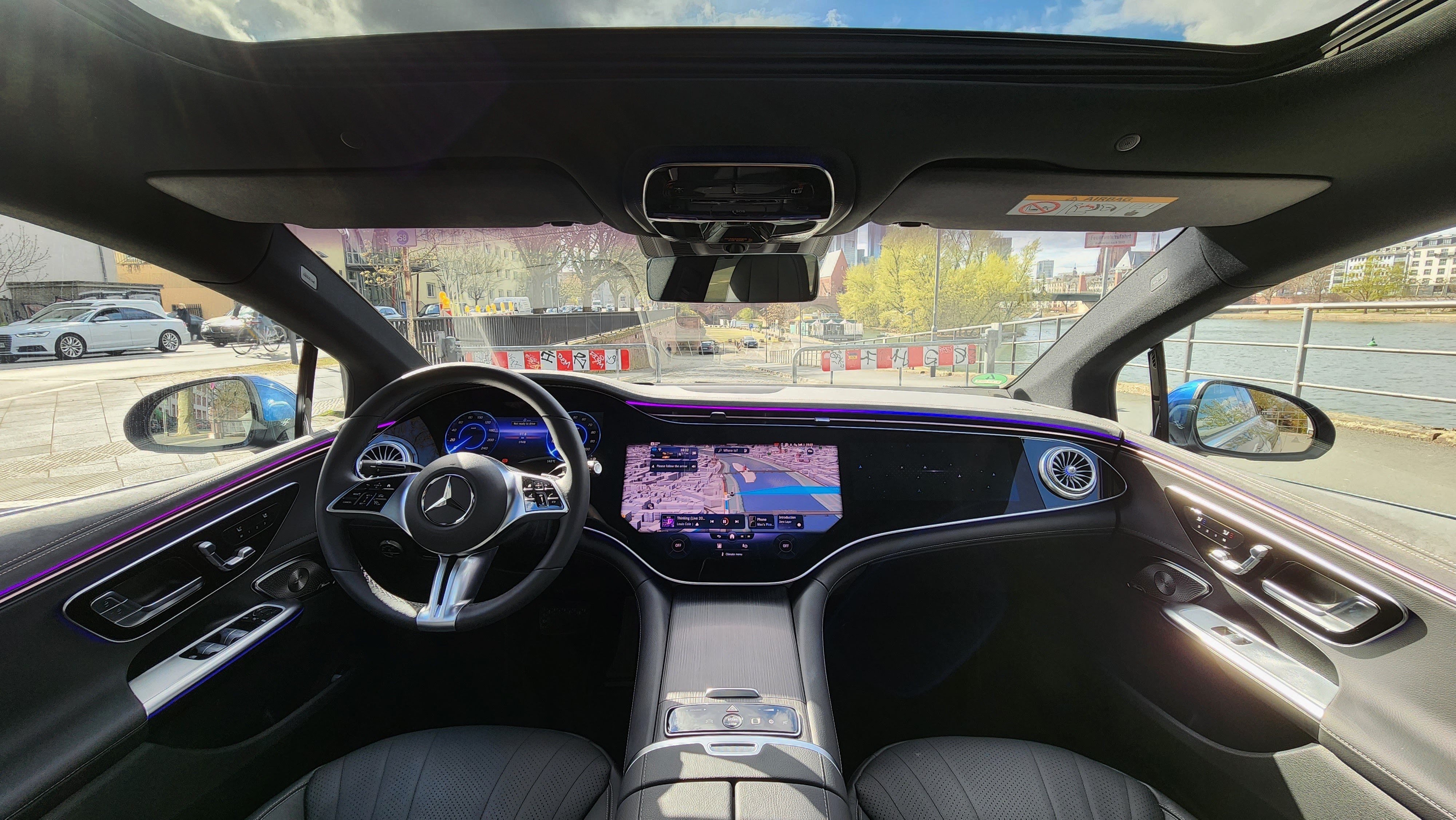
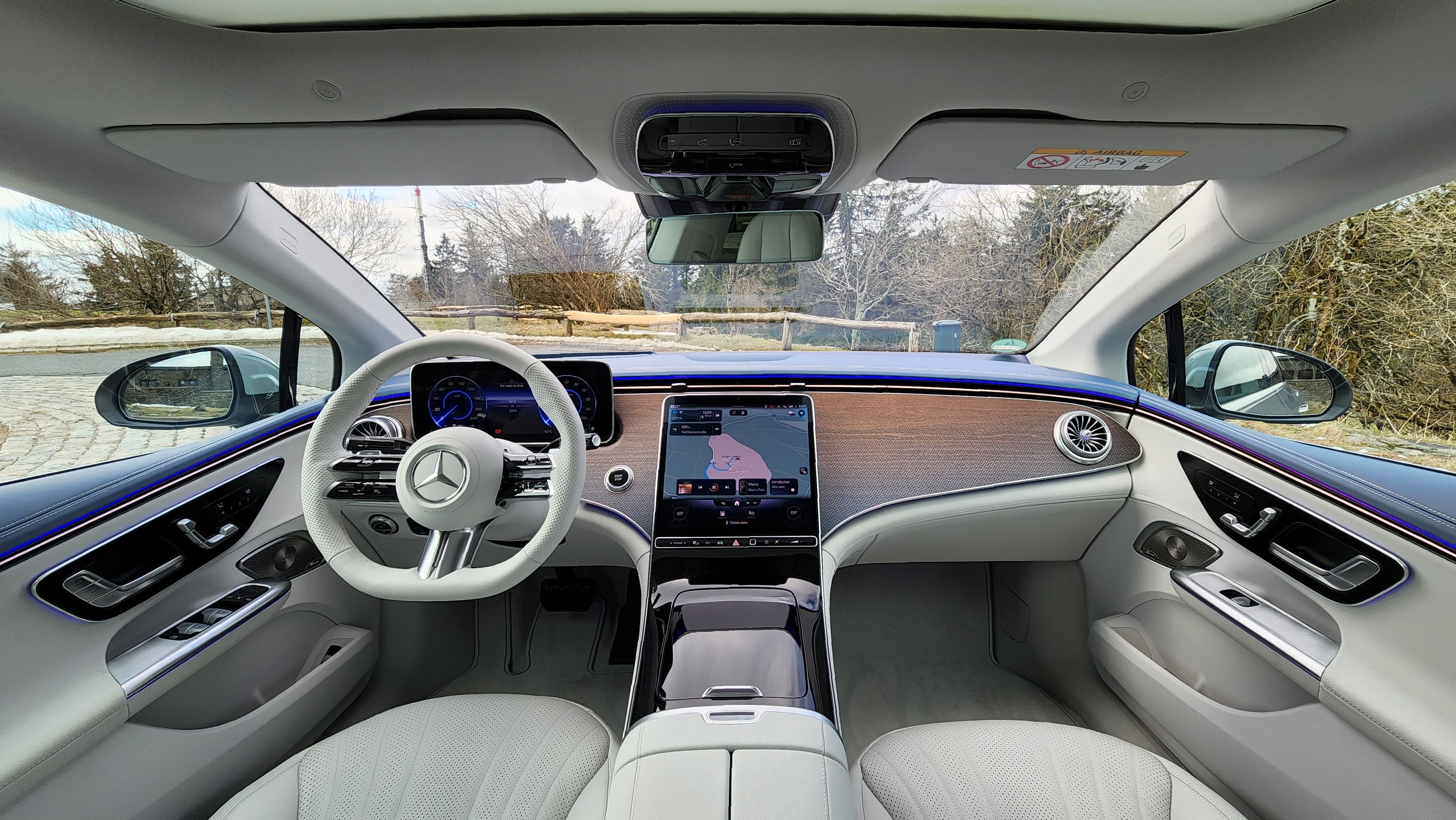
While extremely impressive, the Hyperscreen is also somewhat imposing. In fact, we prefer the standard configuration with the 12.8-inch OLED infotainment touchscreen, because it doesn't give up any functionality other than the additional passenger display, reduces visual clutter, and makes for a more pleasing interior.
Regardless of which screen option you choose, you get haptic feedback, and Mercedes' AR (augmented reality) navigation.
Like the EQS, the EQE includes a comprehensive set of driver assistance and safety features as standard, plus an optional Level 2 ADAS (advanced driver assistance system) that almost rivals Tesla's Autopilot.
The Burmester audio system sounds delightful, and the sensory experience is further augmented by hundreds of LEDs that provide customizable and interactive interior ambient lighting.
Mercedes EQE design
At first glance, it's hard to tell the EQE and the EQS apart. Both share the same awkward egg-like exterior and front proportions – or what Mercedes calls its "one-bow" design.
Yet somehow, the EQE looks better than its larger sibling. The hood (bonnet) is less sloped, the greenhouse is more compact, and the rear end is shorter. Overall, the EQE is 10.4 inches (26.4cm) smaller, but its wheelbase is only 3.6 inches (9.1cm) less.
Compared to its ICE (internal combustion engine) cousin – the E Class – the EQE is 3 inches longer inside with 1 inch more shoulder room. Instead of using a hatch (tailgate) like the EQS, the EQE's trunk (boot) comes with a standard trunk lid below a fixed rear window.
According to Mercedes, this improves rear headroom since there are no tailgate hinges taking up space above the rear passengers.
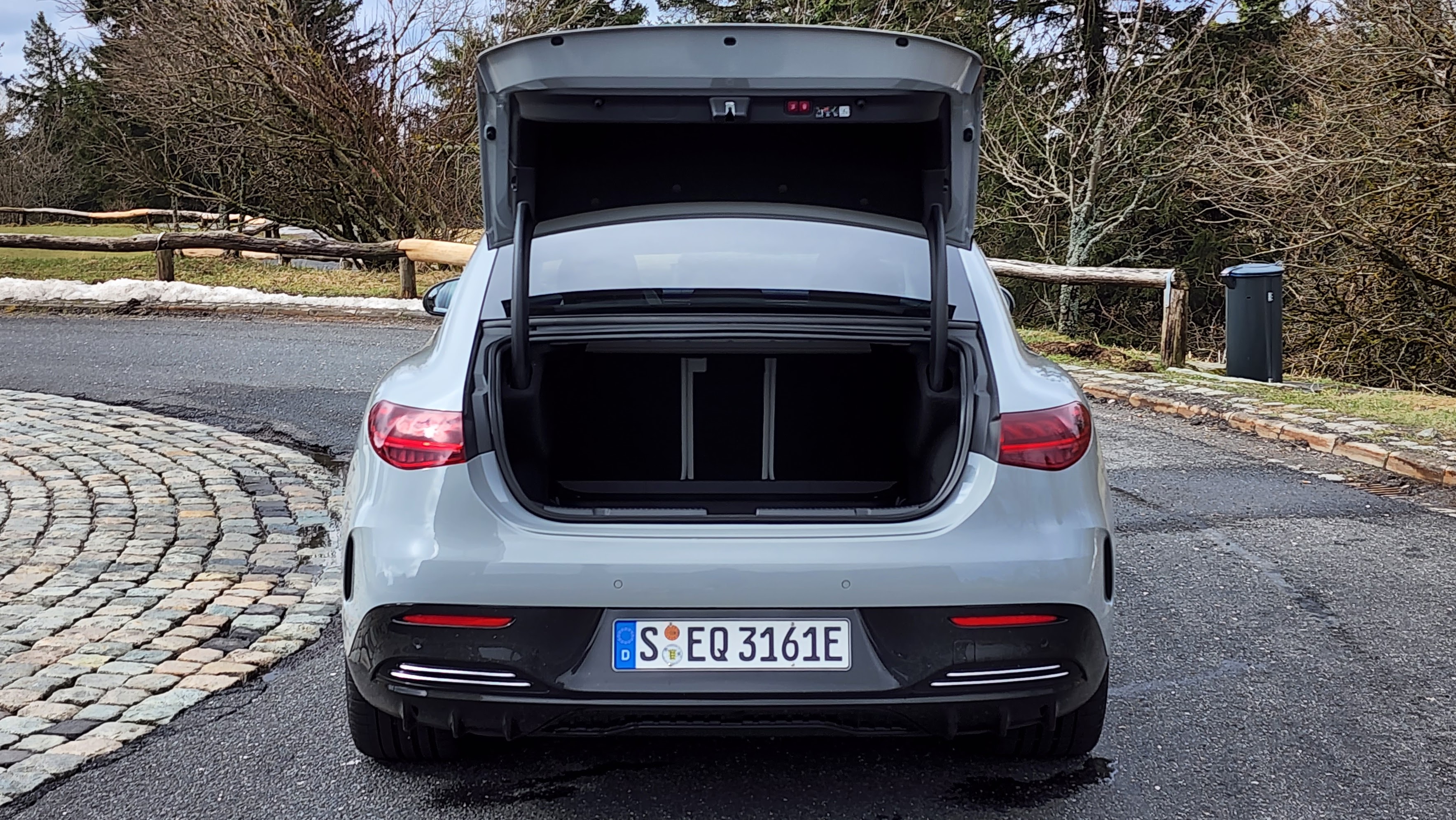
While some EQE trim levels include the same flush, motorized, slide-out door handles as the EQS, others trim levels have traditional door handles instead.
Like most EVs, the EQE is extremely spacious inside, with lots of storage cubbies and 15.1 cu-ft (430 liters) of cargo space with the rear seats folded up. Like its larger sibling, the EQE doesn't have a frunk (front trunk) – in fact, the hood doesn't even open.
The EQE's interior carries over almost unchanged from the EQS. It's just as opulent and sophisticated, and we're particularly fond of the white and blue interior (with copper accents) inside the gray EQE 350+ Edition One we drove.
It's 'chef's kiss' good! On the other hand, we're less enamored with the EQE's high cowl, which carries over from the EQS. It limits front visibility and feels claustrophobic.
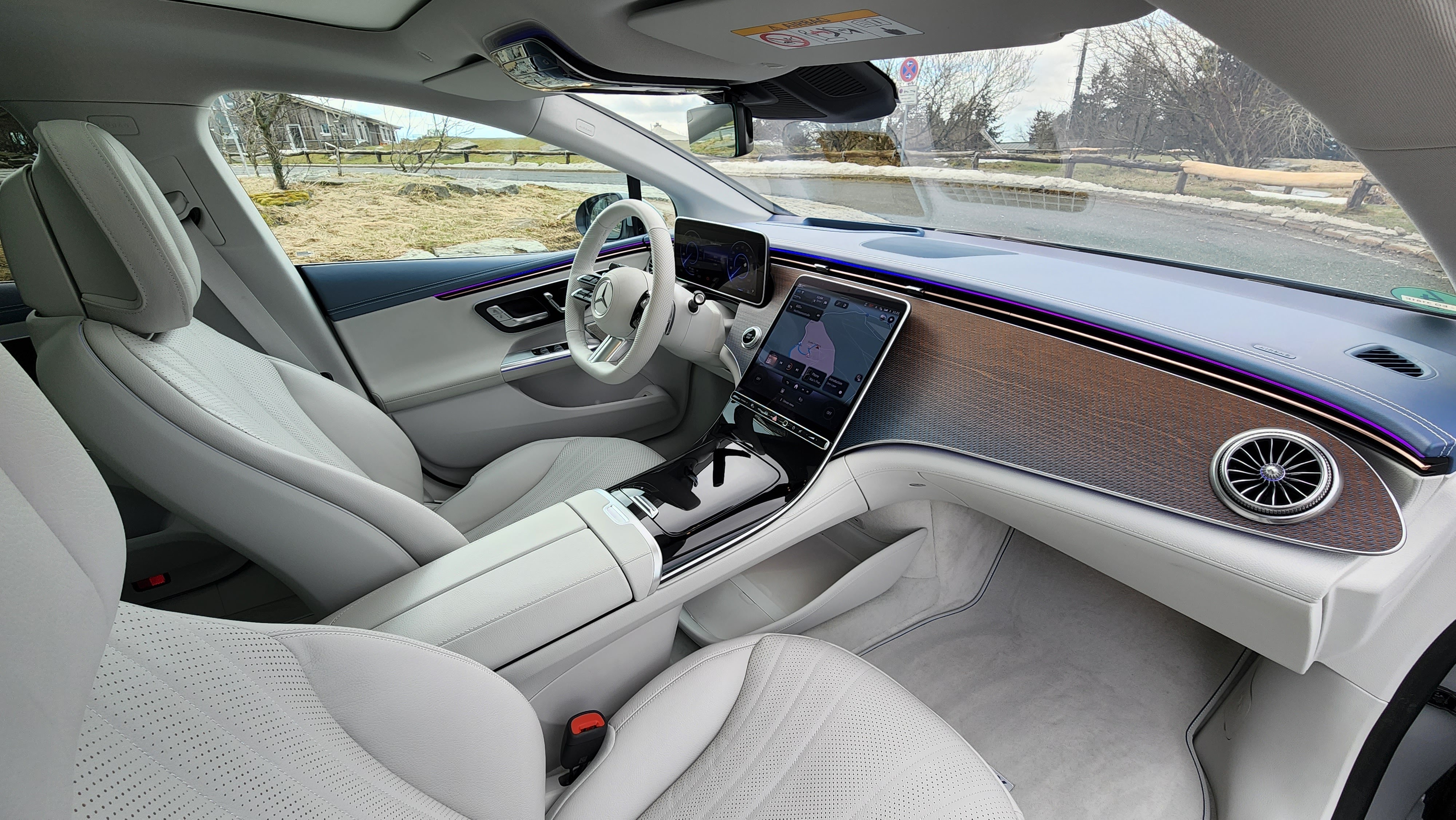
Mercedes EQE driving impressions
We drove a gray EQE 350+ Edition One with 21-inch wheels, the 12.8-inch center OLED touchscreen, and an AMG Line steering wheel, plus a blue EQE 500 4Matic with 20-inch wheels and the Hyperscreen.
Both cars were equipped with rear-wheel steering and the air suspension. Our route took us on damp mountain roads, on the unrestricted Autobahn, and in city traffic, so we experienced a broad range of road conditions.
At 5,200lbs (2,358kg) the EQE is about 400lbs (181kg) lighter than the EQS, and the difference is noticeable. The EQE is definitely more athletic and more playful in the twisties.
Like the EQS, the EQE offers four levels of regen – low, medium, high, and automatic – adjustable with steering wheel paddles. We mostly kept the regen set to high, and the drive mode set to Sport (mountains, Autobahn) or Comfort (city, Autobahn).
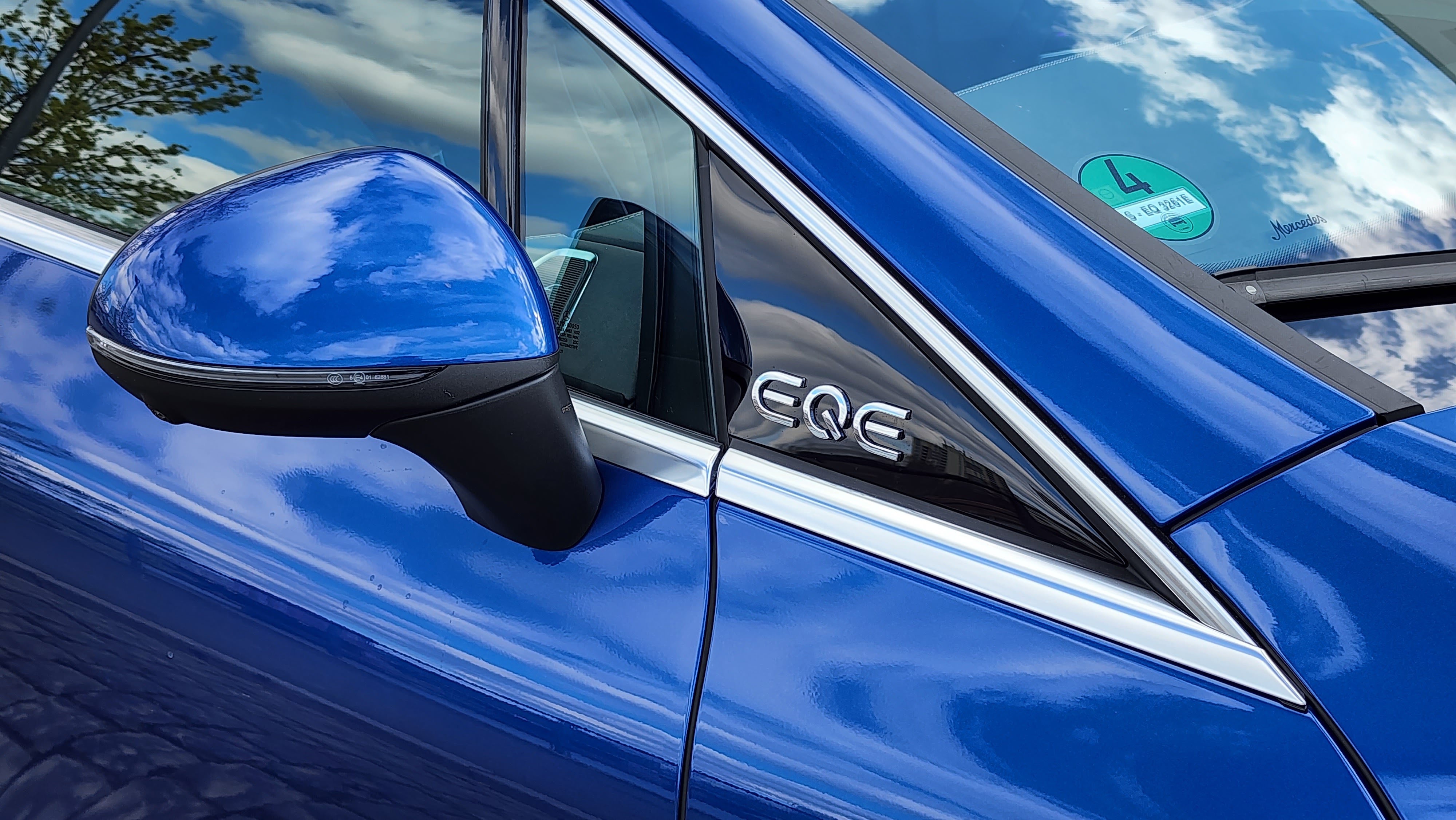
Surprisingly, the EQE does a better job than the EQS at blending regen and hydraulic braking. While the EQE 500 4Matic is certainly punchier off the line, the EQE 350+ doesn't feel like it takes one second longer to reach 60mph.
In other words, acceleration is brisk and satisfying. As with most cars these day, the EQE's steering isn't the most communicative, but Sport mode firms things up (along the dampers).
In typical Mercedes fashion, the EQE's ride is superb. Comfort mode is extremely well tuned and, together with the whisper quiet cabin, makes the EQE ideal for long-distance cruising.
Overall, we enjoyed driving the EQE more than the EQS, especially when it comes to handling and braking. The EQE simply provides a more engaging experience and proves once again that lighter and smaller is always better.
Considering how well sorted the EQE already is, we can't wait to drive the AMG version. For now though, it's clear that the EQE is Mercedes' best EV to date, and one of the best all-electric cars launching this year.

Myriam Joire (tnkgrl) was born wearing combat boots and holding a keyboard. Moments later she picked up a soldering iron. On weekends, she rally-raced with her father. She's been stomping, typing, hacking, and driving ever since. After spending years being a code-monkey in the video game industry, she joined Engadget as Senior Mobile Editor and later Pebble as Chief Evangelist. Today she hosts the weekly Mobile Tech Podcast, makes videos on YouTube, writes about tech and cars for TechRadar and other major publications, and advises startups on product/media strategy. She's based in San Francisco.